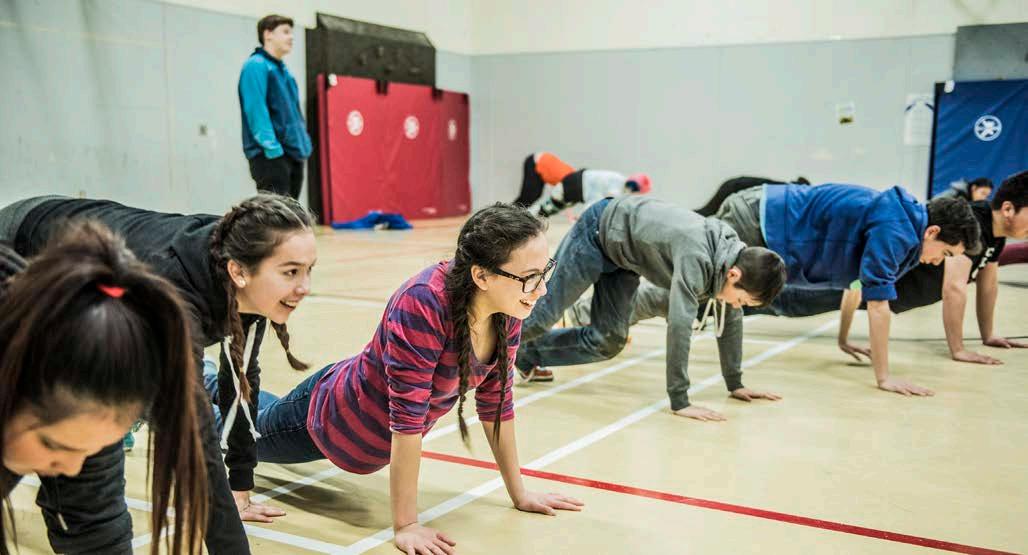
2 minute read
Opportunities NORTH EDUCATION 285 high school grads in NWT Enrolment rebounds in 2022-23; more than $200 million for school services
By Derek Neary Northern
The Northwest Territories produced 285 high school graduates in 2021-22, down from 340 grads a year earlier.
The bulk of the graduates, 153 of them, earned their diplomas in Yellowknife. Regional centres accounted for 69 grads while 63 came from small communities.
The Department of Education calculated that the six-year graduation rate — a newer method based on tracking a cohort within six years of enrolling in Grade 10 — was 60 per cent for the territory in 2020-21. It was highest in Yellowknife, at 74 per cent. It dropped to 55 per cent in NWT regional centres and fell further to 45 per cent in small communities.

Non-Indigenous students graduated at an 81 per cent clip in 2020-21 whereas the rate among Indigenous students was 49 per cent.
The six-year graduation rate shows a gradual rise from about 50 per cent in 2011-12 to 60 per cent in 2020-21.
Conversely, the former Grade 12 graduation methodology, which the Department of Education said “did not accurately count all students who graduated,” showed a gradual downward trajectory between 2009-10 and 2019-20.
The Department of Education is also beginning to transition the NWT junior kindergarten to Grade 12 curriculum to be largely based on the British Columbia curriculum instead of Alberta’s. This is the final year that NWT students will take the Alberta Achievement Tests. The decision to follow the B.C. model of “competencies-driven learning” was based on the province being more closely aligned with 34 “longstanding NWT education priorities,” according to the department.
The process is expected to be complete in 2027-28.
Enrolment rises
Total student enrolment in 2022-23 rose to 8,701, rebounding from 8,666 the previous year and almost identical to the 8,700 students recorded in 2020-21.
As for the number of educators in the territory in 2021-22, the Department of Education stated in mid-May that it was still working with estimated figures. The estimated total number of educators was 1,256, with 511 of them based in small communities, 457 in Yellowknife and 288 in regional centres. In 2020-21, there were 1,068 educators in the NWT.
Territorial funding
Junior kindergarten to Grade 12 school services consumes 55.4 per cent of the Department of Education, Culture and Employment’s annual budget, or $200.2 million out of the $382.3 million allocated. That’s followed by income security (17.5 per cent) and labour development and advanced education (15.7 per cent).
Revised estimates for 2022-23 show that the department spent approximately $200.5 million for junior kindergarten to Grade 12 school services, slightly higher than the $198 million projected budget at the beginning of the fiscal year.
The department anticipates paying out $269.7 million in grants, contributions and transfers in 2023-24. The next largest expense is fees and payments at $41.6 million followed by compensation and benefits to staff at $40.1 million.
The GNWT has $13.5 million in grants earmarked for student financial assistance in 2023-24 so they can attend post-secondary institutions.
Capital estimates drop
ECE only expect to spend $5.6 million on capital projects in 2023-24, a massive reduction from an estimated $34.3 million in 2022-23.
Among the items on the books are a full renovation of Mangilaluk School in Tuktoyaktuk, along with a 7,750-square-foot addition; planning for Colville Lake School and Chief Jimmy Bruneau School in Behchoko; acquiring three portables for Colville Lake School; and playground fencing for Chief Julius School in Fort McPherson and Chief Julian Yendo School in Wrigley.
fact FILE
TOTAL ENROLMENT IN NWT 2022-23
Junior Kindergarten: 498
Kindergarten: 570
Grades 1-6: 3,542
Grades 7-9: 1,739
Grades 10-12: 2,352
Source: Department of Education










